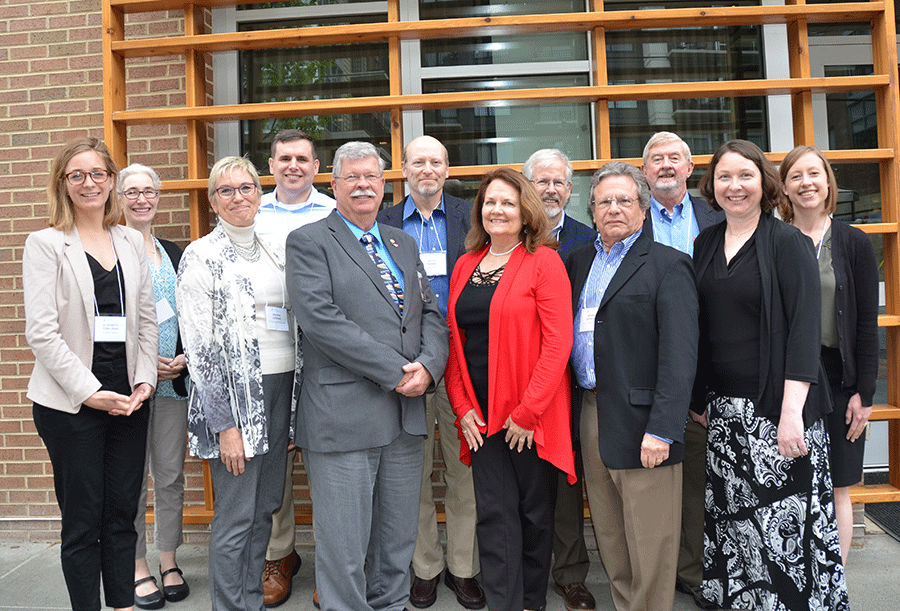National, state, local leaders attend public health messaging conference; seek common ground in shared values
April 27, 2018
Effective communication with diverse audiences is essential to public health practice, especially when it comes to crafting policy and legislation. Yet in politically polarized environments, reaching decision makers across the political spectrum can be daunting.
A unique workshop planned and carried out by leaders at the UNC Gillings School of Global Public Health’s N.C. Institute for Public Health (NCIPH) and held April 25-26 in Chapel Hill, N.C., sought to transform this challenge into an opportunity to improve community health and promote civil discourse.

Workshop participants (l-r) were Lizzie Corcoran (de Beaumont Foundation), Dr. Rachel Wilfert (NCIPH), Dr. Vaughn Upshaw (Gilllings School’s Public Health Leadership Program), Tom Garrett (Counsel for a Strong America), Mike Clampitt (N.C. House of Representatives, District 119), Scott Burris (Temple University School of Law), Sue Lynn Ledford (Wake County, N.C., Health Director), Gary Gunderson (Wake Forest University), Herman Sperling (HJS Markets LLC and Better Angels), Gene Matthews (NCIPH and Southeast Region, Network for Public Health Law), Jeannine Herrick (NCIPH), and Colleen Healy Boufides (Mid-States Region, Network for Public Health Law).
Led by Gene Matthews, JD, a senior investigator at NCIPH, the workshop sought to build diverse leaders’ skills for future public health workforce training.
The event, “Crafting Richer Messengers: The Public Health Advantage,” is the latest in a series of workshops and articles about crafting richer messages in public health. In these, Matthews and his colleagues have worked to empower public health leaders to reach diverse communities with messaging rooted in Moral Foundations Theory.
Regardless of geographic and cultural boundaries, Moral Foundations Theory framework posits that six moral values underlie all human social decision making. These are care, liberty, fairness, loyalty, authority and sanctity. While the values are universal, American liberals and conservatives tend to weigh different values more heavily when making intuitive moral judgements.
While public health practitioners historically have relied upon liberal moral values (care, liberty and fairness) to frame their messages, the team members on this initiative now believe that much of the public health workforce also resonates with the “conservative” moral values (loyalty, authority and sanctity). By recognizing and exploring our public health workforce’s inherent values, the profession can earn public trust and better serve communities.
The workshop intentionally brought together an audience that was diverse politically, geographically, generationally and racially, and it included public health and organizational leaders at the local, state and national levels. All came to the meeting with the goal of finding common ground and planning next steps for collaboration.
“Going forward, public health cannot function without civil discourse taking place at the local level,” Matthews said. “Public health has the skills, ability and expertise to add value to civil discourse at the local level.”
Attendees included N.C. General Assembly Representative Mike Clampitt (N.C. House District 119), Graig Meyer (N.C. House District 50), Yadkin County Commissioner Kevin Austin and Wake County Health Director Sue Lynn Ledford.
Participating from the UNC Gillings School were Matthews, who also is director of the Network for Public Health Law’s southeastern region; Vaughn Upshaw, DrPH, EdD, professor in the School’s Public Health Leadership Program, Jeannine Herrick, MPH, workforce development associate at NCIPH, and Rachel Wilfert, MD, MPH, interim director and training manager at NCIPH and adjunct assistant professor in the School’s Public Health Leadership Program.
Gillings School of Global Public Health contact: David Pesci, director of communications, (919) 962-2600 or dpesci@unc.edu
